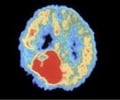
‘Smart combinations of therapies are even more effective in battling some cancers by helping the immune system clear the cancer cells.’
Tweet it Now
"What we found is a combination of cancer therapies that complement each other in helping the immune system clear the cancer," says Mahoney, PhD, assistant professor in the departments of Microbiology, Immunology and Infectious Diseases, and Biochemistry and Molecular Biology at the Cumming School of Medicine and member of the Arnie Charbonneau Cancer and Alberta Children's Hospital Research Institutes. "Our results suggest that we've been looking at these cancer drugs the wrong way -- as tumour-targeting drugs -- instead of what we now feel is their most important biological role: as immune stimulating therapy."
Cancer cells are smart; they know how to hide from the body's own immune system. Cancer cells also know how to control certain immune cells. Like a cruel form of mind control, some cancerous tumours can reprogram some immune cells to "block" other immune cells from attacking, leaving the tumour free to grow.
Treatments aimed at revving up the immune system's attack on the cancer may be the most promising approach to cancer therapy since combination chemotherapy. Yet studies have shown single therapies targeting only one part of the immune system have been effective in only a small percentage of patients.
For the study, researchers combined two therapies, each targeting a different part of the immune system. The first is an injection of a man-made virus. That injection puts the "gas on" the immune system followed by a second injection of a drug being developed as a chemotherapy. That drug stops the tumour from reprogramming immune cells.
Advertisement
When the researchers added a third complementary immunotherapy, the cure rate went as high as 80 to 100 per cent. Results of the study are published in Nature Communications.
Advertisement
Source-Eurekalert














